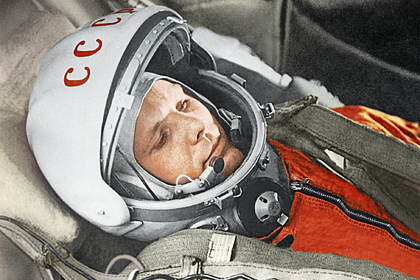The success of the first cosmonaut also contributed to the accelerated development of space technology, said Ioannis DaglisATHENS, April 11.
/tass/. Yuri Gagarin's flight into space is a worldwide historical achievement, he inspired millions of people, especially young people. This was stated in an interview with TASS on the eve of Cosmonautics Day by the president of the Greek Space Center, Professor of space Physics at the University of Athens Ioannis Daglis.
According to him, the reason why the International Day of Human Spaceflight, established by the UN General Assembly in 2011, is celebrated is, of course, the flight of 27-year-old military pilot Yuri Alekseevich Gagarin, who on the Vostok spacecraft was the first to leave the protective atmosphere of the Earth and entered the dark abyss of space, embodying the dream life of [Konstantin] Tsiolkovsky and [Robert] Goddard, as well as Jules Verne, Arthur C. Clarke and Isaac Asimov." "This is a worldwide historical achievement both at the scientific and technological level and at the level of symbolism," the president of the center continued. - Space by its very nature is not just a hostile space, but also a deadly one for humans. Understanding the harsh physical properties of this space, as well as the development and creation of technologies that ensure human survival in space, have opened a new chapter in the history of mankind, for the first time allowing him a creative presence outside the protective boundaries of the primary habitat of our species - planet Earth."
Daglis stressed that "on a symbolic level, Yuri Gagarin was the first to carry the research spirit of the human race beyond the narrow limits of our planet, inspiring millions of people, especially young people."
"I believe that both aspects of Gagarin's achievements were and remain equally important for humanity: technology and inspiration. Even today, Gagarin's name is associated with the expansion of our capabilities and epic space adventures," said the president of the space center.
"Finally, we cannot lose sight of the scale of the rivalry between the USSR and the USA, which was fueled by Gagarin's success and led to the acceleration of the development of space technology," Daglis added.
Space flight and visit to Athens
On April 12, 1961, at 09:07 Moscow time, an 8K72K carrier rocket (later called Vostok) was launched from the 5th Research Test Site of the USSR Ministry of Defense (the so-called Baikonur Cosmodrome at that time), which launched the Vostok satellite ship with Yuri Gagarin on board into Earth orbit.
The Vostok made one orbit around the Earth, on the same day Gagarin returned to Earth. He ejected from the descent vehicle of the ship and landed with a parachute on a collective farm field near the village of Smelovka, Saratov region.
The first space flight aroused great interest all over the world, and Gagarin himself turned into a world celebrity. At the invitation of foreign governments and public organizations, he visited about 30 countries. On February 12, 1962, at the invitation of the Greek-Soviet Society, Gagarin came to Greece for two days as part of his circle of honor around the world. Then the Mayor of Athens, Angelos Tsoukalas, proclaimed the Soviet cosmonaut an honorary citizen of the Greek capital and presented him with a gold medal, and thousands of people solemnly greeted him in front of the city hall. The Greek newspapers of those years published pictures of Gagarin at the Parthenon Temple on the Acropolis of Athens and the handshake of the first cosmonaut of the Earth with the then Prime Minister of Greece, Konstantinos Karamanlis, who received him in his political bureau.

